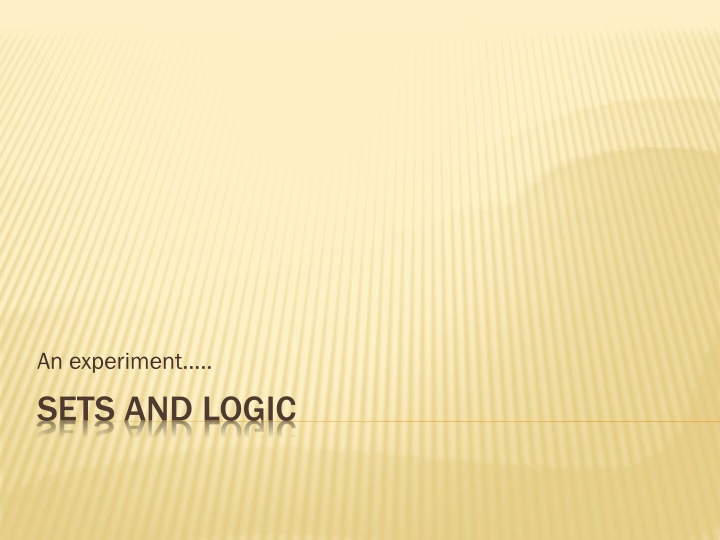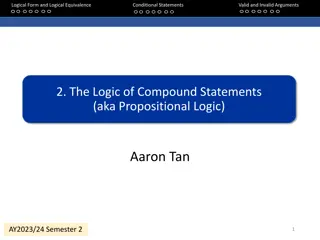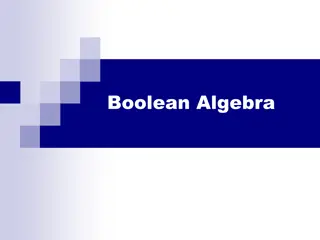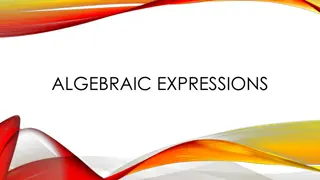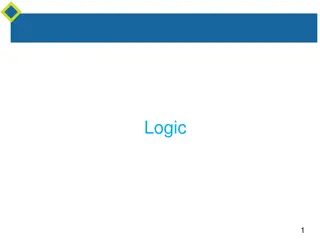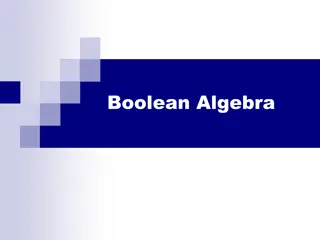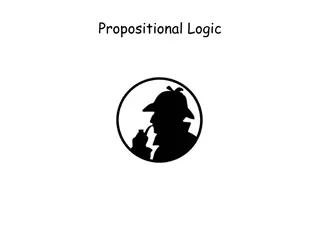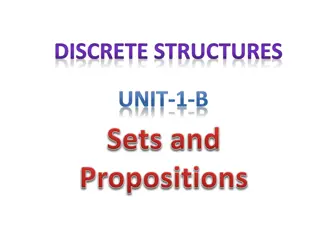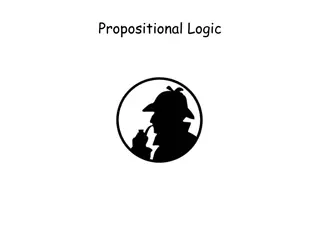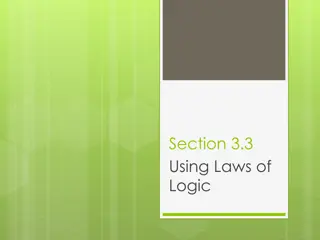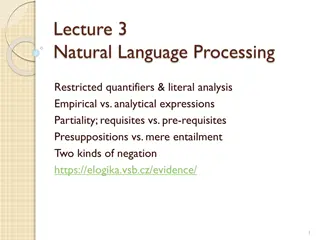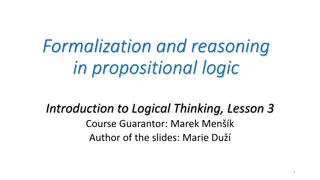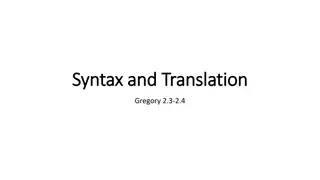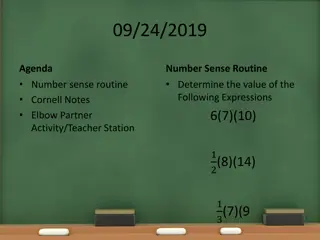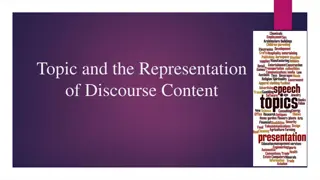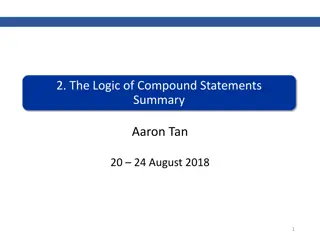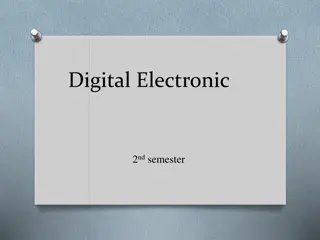Logical Expressions and Symbolism in Sentential Logic
Understanding sentential logic, logical expressions, and symbols through examples of logical reasoning and inference. Explore the concepts of logical OR, AND, negation, and the complexities of inclusive and exclusive logic in various scenarios.
Download Presentation

Please find below an Image/Link to download the presentation.
The content on the website is provided AS IS for your information and personal use only. It may not be sold, licensed, or shared on other websites without obtaining consent from the author.If you encounter any issues during the download, it is possible that the publisher has removed the file from their server.
You are allowed to download the files provided on this website for personal or commercial use, subject to the condition that they are used lawfully. All files are the property of their respective owners.
The content on the website is provided AS IS for your information and personal use only. It may not be sold, licensed, or shared on other websites without obtaining consent from the author.
E N D
Presentation Transcript
An experiment.. SETS AND LOGIC
SENTENTIAL LOGIC Creating Logical Expressions from Sentences, and vice versa Ex: Either it will rain or snow tomorrow P : It will rain tomorrow Q : It will snow tomorrow Written logically P or Q Logical notation: P Q
SENTENTIAL LOGIC Either it will rain or snow tomorrow P: It will rain tomorrow Q: It will snow tomorrow R: It cannot snow since its Florida Combining Assume ? ? And not R, which is not Q Therefore P
ANOTHER EXAMPLE Inconsistent or invalid logic Either the butler or maid is guilty: ? ? : 1 Either the maid or cook is guilty: ? ? : 2 Therefore, either the butler or cook is guilty Obviously this is false: One might conclude the maid is guilty We will revisit this
LOGICAL SYMBOLS Logical OR: ? ? Logical AND: ? ? Logical Negation: ? ( Not A) The AND is easy .. The Or is tricky inclusive or exclusive
LOGICAL SYMBOLS Either the butler or the maid is guilty ? ? Question: Can both the butler and maid be guilty Answer: Our choice ( inclusive ): Yes: Either B or M or both An alternative ( exclusive ): No: Either B or M not both
REVISITING Inconsistent or invalid logic Either the butler or maid is guilty: ? ? : P Either the maid or cook is guilty: ? ? : Q Combined (? ?) (? ?) = ? ? Therefore, either the butler or cook is guilty FALSE Conclusion if we believe ? ? ? Do we know anything?
MORE EXAMPLES: DISCUSSION WRITE AS LOGICAL EXPRESSIONS Either John went to the store or we re out of eggs Joe is going to leave home and not come back Either Bill is at work and Jane isn t, or Jane is at work and Bill isn t
REVIEW 1: And: OR: Not: ?? And s are easy Or s are tricky Inclusive or: ? ? , P or Q or ( P and Q) Exclusive or: (? ?) (? ?) If P and Q are exclusive, i.e. if P and Q cannot happen, the inclusive and exclusive or is the same By the Or symbol: we always mean inclusive or
WRITE AS SENTENCES ( ? ?) ? where S: John is stupid, L: John is lazy ? ? ? (? ?) ?
SECTION 2: TRUTH TABLES ? ? ? ? ? ? (? ?) ?
FROM SENTENCES TO TRUTH TABLES Premises: It will either rain or snow tomorrow It s too warm for snow Conclusion It will rain Show this with the truth table
SENTENCES TO TRUTH TABLES Premises Either John isn t stupid and he is lazy, or he s stupid John is stupid Conclusion: Therefore John isn t lazy???
SENTENCES TO TRUTH TABLES Premises: The butler and the cook are not both innocent Either the butler is lying or the cook is innocent Conclusion The butler is either lying or guilty
EQUIVALENT STATEMENTS Defn Defn: Statements with identical truth tables are : Statements with identical truth tables are equivalent: equivalent: Which statements are equivalent ? ? , ? ? , ? ?
LOGICAL LAWS DeMorgan s Laws ? ? ?? ?????????? ?? ? ? ?? ?????????? ?? ? ? ? ? Commutative, Associative, and Idempotent Distributive ? ? ? ?? ?????????? ?? (? ?) (? ?) ? Q ? ?? ?????????? ?? ? ? ? ? Absorption: ? ? ? ?? ?????????? ?? ? ? ? ? ?? ?????????? ?? ?
USING THE LOGICAL LAWS Simplify ? ? (? ?) ?
TAUTOLOGIES AND CONTRADICTIONS Statements or Formulas which are always true are Tautologies Formulas that are always false are Contradictions ? ?????????? ? ????????? ; ? ????????????? ; ? (?????????????)
TAUTOLOGIES AND CONTRADICTIONS Are the following tautologies or contradictions ? ? ? ? (? ?) ? ? ?
SIMPLIFYING FORMULAS Use the Logic Laws to Simplify, if possible, noting which laws your are using ? (? ?) (? ? ? ) ? (? ?) ( ? ? ? )
VARIABLES AND SETS We will consider statements dependent upon a variable or a number of variables Ex s P(x): x is a prime number D(x,y): x is divisible by y In this case we don t have truth tables we have truth sets
VARIABLES AND SETS Consider P(x), the statement that x is a prime number Consider D(x,y), the statement that x is divisible by y Given x, what is the truth set of D(x,y) if P(x) is true?
EXAMPLES: USE VARIABLES AND SETS x is a prime number and either y or z is divisible by x x is a man and y is a woman and x likes y and y doesn t like x
SET NOTATION ? = ? ? ? ?? ???? ? ?,? = (?,?) ? = ??, ??? ? ? ? = ? ? ?? ?????
SET NOTATION AND TRUTH SETS ?(?,?)= {(?,?) ?=??, ??? ?,?,? ,} The truth set for T?(? ?,3 ) = Or we could view D(3,y) as a function of only one variable, thus the truth set is simply ??(? ?,3 ) = {3,6,9,12,15,18 .} What is the truth set for ? ?,? ? 3,3 , 6,3 , 9,3 , 12,3
SET NOTATION AND TRUTH SETS Let ?(?)= {? ? ?? ?????} Let ?(?,?)= {(?,?) 2 ?=??, ??? ? } Find a statement about the truth sets of ? ?,? which is equivalent to ?(?)
MORE SETS AND TRUTH SETS ?(?,?) = (?,?) 2?2< ? The set is can also be written as S(?,?) = (?,?) 2 ? < ? < ? or
OPERATIONS ON SETS Let ? ??? ? be sets Union: ? ? = ? ??? ??? ??? Intersection: ? ? = ? ? ? ??? ? ? Difference ?\B = ? ? ? ??? ? ? Symmetric difference ? ? = ?\B ?\A = (? ?)\(? ?)
OPERATIONS ON SETS AND LOGICAL OPS Turn these set operations into logical statements, and perhaps simplify ??? ? ? ? ? \ (? ?) ? (? ?) (? ?)
A NEW SET THEORY IDENTITY ? \ ? ? Use Logical notation Use Venn Diagrams
CONDITIONAL STATEMENTS P implies Q: ? ? If its raining and I don t have my umbrella, then I ll get wet. If Mary did her homework, then the teacher won t collect it, and if she didn t, the he ll ask her to do it on the board
EQUIVALENCES ? ? is equivalent to ? ? ? ? is equivalent to (? ?)
THE CONVERSE AND CONTRAPOSITIVE Consider ? ? and ? ? ? ? is called the converse of ? ? ? ? is the contrapositive of ? ?
